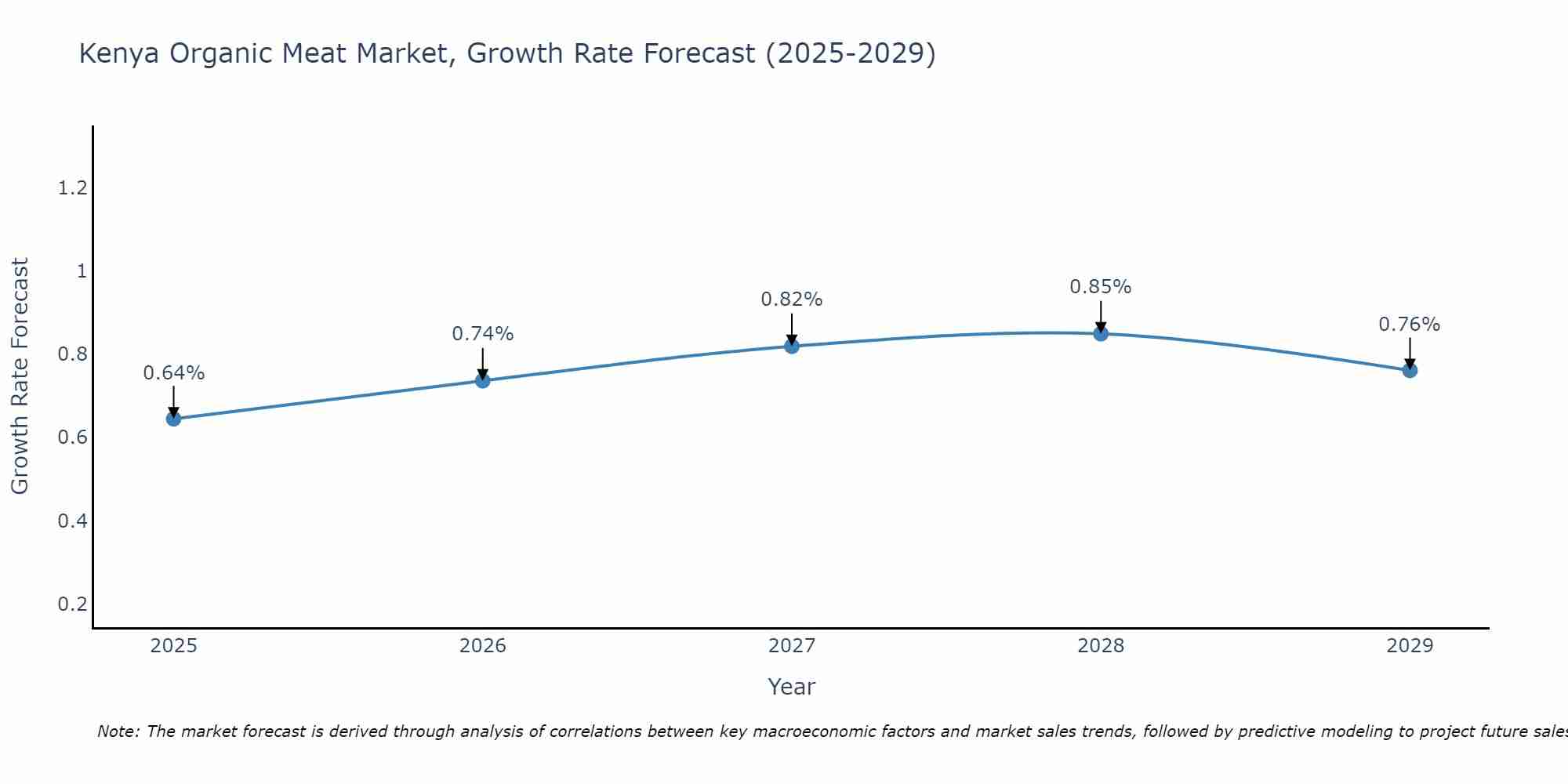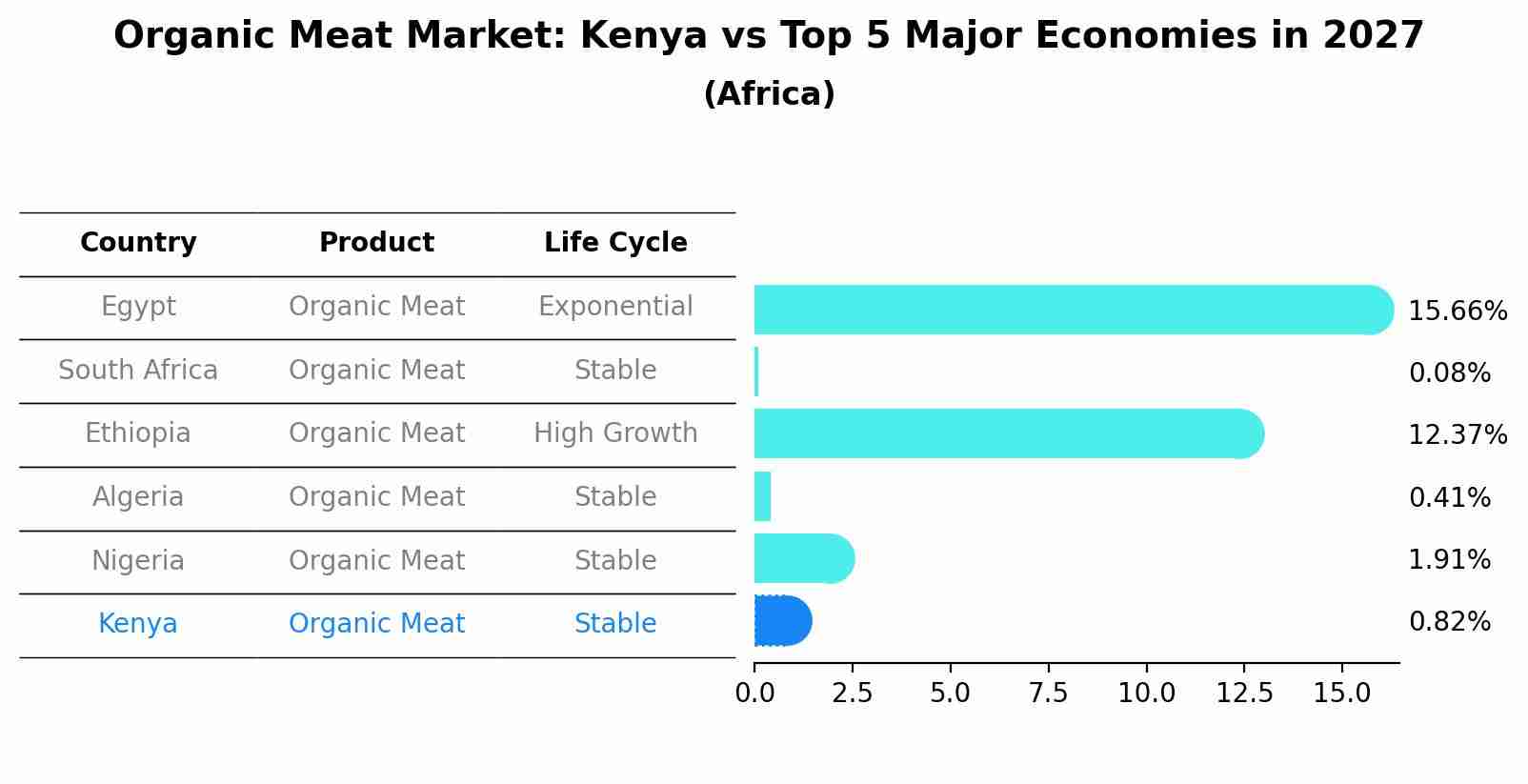Kenya Organic Meat Market (2025-2031) Outlook | Share, Industry, Growth, Companies, Forecast, Revenue, Size, Analysis, Trends & Value
| Product Code: ETC383630 | Publication Date: Aug 2022 | Updated Date: Jul 2025 | Product Type: Market Research Report | |
| Publisher: 6Wresearch | Author: Sumit Sagar | No. of Pages: 75 | No. of Figures: 35 | No. of Tables: 20 |
Kenya Organic Meat Market Size Growth Rate
The Kenya Organic Meat Market is projected to witness mixed growth rate patterns during 2025 to 2029. The growth rate begins at 0.64% in 2025, climbs to a high of 0.85% in 2028, and moderates to 0.76% by 2029.

Organic Meat Market: Kenya vs Top 5 Major Economies in 2027 (Africa)
By 2027, Kenya's Organic Meat market is forecasted to achieve a stable growth rate of 0.82%, with Egypt leading the Africa region, followed by South Africa, Ethiopia, Algeria and Nigeria.

Kenya Organic Meat Market Synopsis
The Kenya organic meat market is experiencing steady growth driven by increasing consumer awareness of the health and environmental benefits of organic products. The demand for organic meat in Kenya is rising due to concerns about food safety, animal welfare, and sustainability. Organic meat producers in Kenya are adopting environmentally friendly practices such as pasture-raised livestock and no use of antibiotics or hormones, attracting consumers seeking high-quality, ethically produced meat. Key players in the Kenya organic meat market include farmers, butchers, supermarkets, and online retailers offering a variety of organic meat products such as beef, chicken, and lamb. The market is expected to continue expanding as more consumers prioritize organic and sustainable food choices, presenting opportunities for further growth and development in the organic meat sector in Kenya.
Kenya Organic Meat Market Trends
The Kenya Organic Meat Market is experiencing a growing demand for organic and naturally raised meat products, driven by increasing consumer awareness of health and sustainability issues. Consumers are seeking meat products that are free from antibiotics, hormones, and other additives, as well as products that are sourced from animals raised in ethical and environmentally friendly conditions. There is also a rising interest in unique and exotic meat varieties, such as ostrich and game meat, among health-conscious consumers. This trend is supported by a growing number of organic meat producers and retailers in Kenya, offering a wider range of organic meat products to cater to the evolving preferences of consumers seeking healthier and more sustainable food options.
Kenya Organic Meat Market Challenges
In the Kenya Organic Meat Market, some challenges faced include limited consumer awareness and understanding of the benefits of organic meat, leading to lower demand compared to conventional meat products. There is also a lack of strict regulations and certification standards for organic meat production, resulting in potential issues with quality control and authenticity. Additionally, the higher production costs associated with organic farming practices make organic meat products more expensive, restricting access to a broader consumer base. Distribution and logistics challenges further hinder the growth of the market, as organic meat producers may struggle to reach a wider audience beyond local markets. Overall, overcoming these challenges will require increased education and promotion efforts, improved regulations, and more efficient supply chain solutions to drive the growth of the Kenya Organic Meat Market.
Kenya Organic Meat Market Investment Opportunities
The Kenya Organic Meat Market presents promising investment opportunities due to the increasing consumer demand for organic and ethically sourced products. With a growing focus on health and sustainability, there is a rising preference for organic meat that is free from antibiotics, hormones, and synthetic chemicals. Investors can consider opportunities in organic meat production, processing, distribution, and retailing. Collaborating with local farmers to promote organic farming practices and certification can also be a lucrative investment strategy. Additionally, investing in marketing and branding efforts to educate consumers about the benefits of organic meat can help capture a larger market share. Overall, the Kenya Organic Meat Market offers a ripe environment for investors looking to capitalize on the growing trend towards organic and sustainable food products.
Jordan Agar Market Government Policies
The Kenyan government has introduced various policies to support the growth of the organic meat market in the country. These policies include the National Organic Agriculture Policy, which aims to promote organic farming practices and ensure the production of high-quality organic products, including meat. Additionally, the government has established the Kenya Organic Agriculture Network (KOAN) to provide support and guidance to organic farmers and stakeholders. The Kenya Meat Control Act regulates the production, processing, and sale of meat products, ensuring that organic meat meets safety and quality standards. Furthermore, the government is actively promoting organic farming through initiatives such as training programs, certification schemes, and financial incentives to encourage more farmers to transition to organic practices in the meat industry.
Kenya Organic Meat Market Future Outlook
The future outlook for the Kenya Organic Meat Market appears promising, driven by increasing consumer awareness and demand for healthier and sustainably produced food products. With a growing focus on organic farming practices and ethical treatment of animals, consumers are showing a preference for organic meat products over conventionally produced ones. This trend is expected to continue as more consumers prioritize health and environmental sustainability in their food choices. Additionally, government support for organic farming initiatives and certifications is likely to further boost the market growth. Overall, the Kenya Organic Meat Market is anticipated to witness steady expansion in the coming years, presenting opportunities for market players to capitalize on the growing demand for organic and ethically sourced meat products.
Key Highlights of the Report:
- Kenya Organic Meat Market Outlook
- Market Size of Kenya Organic Meat Market, 2024
- Forecast of Kenya Organic Meat Market, 2031
- Historical Data and Forecast of Kenya Organic Meat Revenues & Volume for the Period 2021 - 2031
- Kenya Organic Meat Market Trend Evolution
- Kenya Organic Meat Market Drivers and Challenges
- Kenya Organic Meat Price Trends
- Kenya Organic Meat Porter's Five Forces
- Kenya Organic Meat Industry Life Cycle
- Historical Data and Forecast of Kenya Organic Meat Market Revenues & Volume By Type for the Period 2021 - 2031
- Historical Data and Forecast of Kenya Organic Meat Market Revenues & Volume By Poultry for the Period 2021 - 2031
- Historical Data and Forecast of Kenya Organic Meat Market Revenues & Volume By Beef for the Period 2021 - 2031
- Historical Data and Forecast of Kenya Organic Meat Market Revenues & Volume By Pork for the Period 2021 - 2031
- Historical Data and Forecast of Kenya Organic Meat Market Revenues & Volume By Others for the Period 2021 - 2031
- Historical Data and Forecast of Kenya Organic Meat Market Revenues & Volume By Application for the Period 2021 - 2031
- Historical Data and Forecast of Kenya Organic Meat Market Revenues & Volume By Food Services for the Period 2021 - 2031
- Historical Data and Forecast of Kenya Organic Meat Market Revenues & Volume By Retail for the Period 2021 - 2031
- Historical Data and Forecast of Kenya Organic Meat Market Revenues & Volume By Distribution Channel for the Period 2021 - 2031
- Historical Data and Forecast of Kenya Organic Meat Market Revenues & Volume By B2C for the Period 2021 - 2031
- Historical Data and Forecast of Kenya Organic Meat Market Revenues & Volume By B2B for the Period 2021 - 2031
- Kenya Organic Meat Import Export Trade Statistics
- Market Opportunity Assessment By Type
- Market Opportunity Assessment By Application
- Market Opportunity Assessment By Distribution Channel
- Kenya Organic Meat Top Companies Market Share
- Kenya Organic Meat Competitive Benchmarking By Technical and Operational Parameters
- Kenya Organic Meat Company Profiles
- Kenya Organic Meat Key Strategic Recommendations
Frequently Asked Questions About the Market Study (FAQs):
- Single User License$ 1,995
- Department License$ 2,400
- Site License$ 3,120
- Global License$ 3,795
Search
Thought Leadership and Analyst Meet
Our Clients
Related Reports
- Afghanistan Apparel Market (2026-2032) | Growth, Outlook, Industry, Segmentation, Forecast, Size, Companies, Trends, Value, Share, Analysis & Revenue
- Canada Oil and Gas Market (2026-2032) | Share, Segmentation, Value, Industry, Trends, Forecast, Analysis, Size & Revenue, Growth, Competitive Landscape, Outlook, Companies
- Germany Breakfast Food Market (2026-2032) | Industry, Share, Growth, Size, Companies, Value, Analysis, Revenue, Trends, Forecast & Outlook
- Australia Briquette Market (2025-2031) | Growth, Size, Revenue, Forecast, Analysis, Trends, Value, Share, Industry & Companies
- Vietnam System Integrator Market (2025-2031) | Size, Companies, Analysis, Industry, Value, Forecast, Growth, Trends, Revenue & Share
- ASEAN and Thailand Brain Health Supplements Market (2025-2031) | Strategy, Consumer Insights, Analysis, Investment Trends, Opportunities, Growth, Size, Share, Industry, Revenue, Segments, Value, Segmentation, Supply, Forecast, Restraints, Outlook, Competition, Drivers, Trends, Demand, Pricing Analysis, Competitive, Strategic Insights, Companies, Challenges
- ASEAN Bearings Market (2025-2031) | Strategy, Consumer Insights, Analysis, Investment Trends, Opportunities, Growth, Size, Share, Industry, Revenue, Segments, Value, Segmentation, Supply, Forecast, Restraints, Outlook, Competition, Drivers, Trends, Demand, Pricing Analysis, Competitive, Strategic Insights, Companies, Challenges
- Europe Flooring Market (2025-2031) | Outlook, Share, Industry, Trends, Forecast, Companies, Revenue, Size, Analysis, Growth & Value
- Saudi Arabia Manlift Market (2025-2031) | Outlook, Size, Growth, Trends, Companies, Industry, Revenue, Value, Share, Forecast & Analysis
- Uganda Excavator, Crane, and Wheel Loaders Market (2025-2031) | Strategy, Consumer Insights, Analysis, Investment Trends, Opportunities, Growth, Size, Share, Industry, Revenue, Segments, Value, Segmentation, Supply, Forecast, Restraints, Outlook, Competition, Drivers, Trends, Demand, Pricing Analysis, Competitive, Strategic Insights, Companies, Challenges
Industry Events and Analyst Meet
Whitepaper
- Middle East & Africa Commercial Security Market Click here to view more.
- Middle East & Africa Fire Safety Systems & Equipment Market Click here to view more.
- GCC Drone Market Click here to view more.
- Middle East Lighting Fixture Market Click here to view more.
- GCC Physical & Perimeter Security Market Click here to view more.
6WResearch In News
- Doha a strategic location for EV manufacturing hub: IPA Qatar
- Demand for luxury TVs surging in the GCC, says Samsung
- Empowering Growth: The Thriving Journey of Bangladesh’s Cable Industry
- Demand for luxury TVs surging in the GCC, says Samsung
- Video call with a traditional healer? Once unthinkable, it’s now common in South Africa
- Intelligent Buildings To Smooth GCC’s Path To Net Zero


















